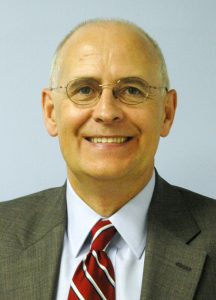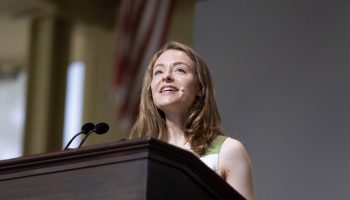When a bride and groom stand at the altar to exchange vows, what justifies their commitment? Is it faith, or reason, or something else? Vernon F. Gallagher Chair for the Integration of Science, Theology, Philosophy, and Law at Duquesne University Gerard Magill argues that their commitment is a result of imagination.

“Those young couples have the imagination to see themselves living together,” Magill said. “Reason helps explain it, faith helps support it, but the actual discernment of falling in love to the point of marriage is a function of imagination.”
Imagination doesn’t just lend itself to romantic decisions. Magill argues that imagination is a crucial, but often overlooked, aspect of ethics. Magill will explore this in a presentation called “Technology, Ethics, & Imagination” at 2 p.m. EDT Monday, July 20, on the CHQ Assembly Video Platform. His presentation is part of the Week Four theme for the Interfaith Lecture Series, “Ethics in a Technologically Transforming World?”
According to Magill, ethicists tend to consider two main pillars — faith and reason — in their ethical thinking. But, without imagination, Magill believes that dilemmas cannot be thoughtfully examined. To illustrate this, Magill pointed to the example of climate change. If people cannot fully picture the effects of climate change, they cannot fully make changes to combat it or find a solution.
If you look at the pace of civilized societies over the past 500 years, things developed slowly and solidly, and we eventually ended up with the democratic societies that we have today. What took 400 to 500 years to develop, we are now capturing in five to ten years,” Magill said. “Technology is moving at such a pace across everything that we’re doing, that it is crucial to ask the question: ‘Should we do something, simply because we can do it?”
“If we are incapable of our imaginations telling us, ‘There’s a red light flashing here,’ if we don’t have the imagination to see the problem, then we will certainly not have the imagination to solve the problem,” Magill said.
After establishing imagination’s role in ethics in his presentation, Magill will explore how these elements play a role in technology.
“If you look at the pace of civilized societies over the past 500 years, things developed slowly and solidly, and we eventually ended up with the democratic societies that we have today. What took 400 to 500 years to develop, we are now capturing in five to ten years,” Magill said. “Technology is moving at such a pace across everything that we’re doing, that it is crucial to ask the question: ‘Should we do something, simply because we can do it?”
Magill’s professional experience is in medical ethics. At Duquesne University, he has researched a multitude of topics from human genomics to research ethics to patient safety.
“What brought me to ethics in general was a sense of a call to advance value in people’s lives. I decided medical ethics because medicine fascinated me,” Magill said. “I’ve always been fascinated by the science and research of medicine.”
In his career, Magill has contributed to 10 books, either as author, co-author or editor. These books cover issues of medical ethics, and many with the added lens of religious morality. Like his decision to pursue life as an ethicist, Magill narrows down subjects that inspire him, and chooses to only write about the things that matter most to him.
“The most important thing is that you fall in love with the topic. I try to explain to students if you’re going to push your research into writing a book, you’ve got to be driven, you’ve got to fall in love with your topic,” Magill said. “A topic’s got to be not just important in health or something. It’s got to be driven by your inner charisma.”
This program is made possible by “The Lincoln Ethics Series” funded by the David and Joan Lincoln Family Fund for Applied Ethics & the Arthur and Helen Reycroft Memorial Religious Lectureship Fund.




